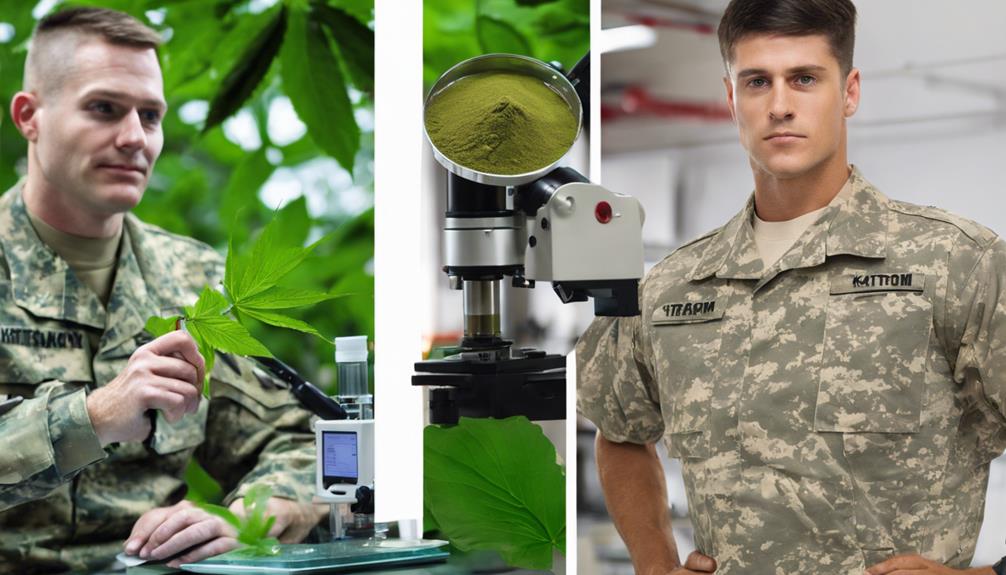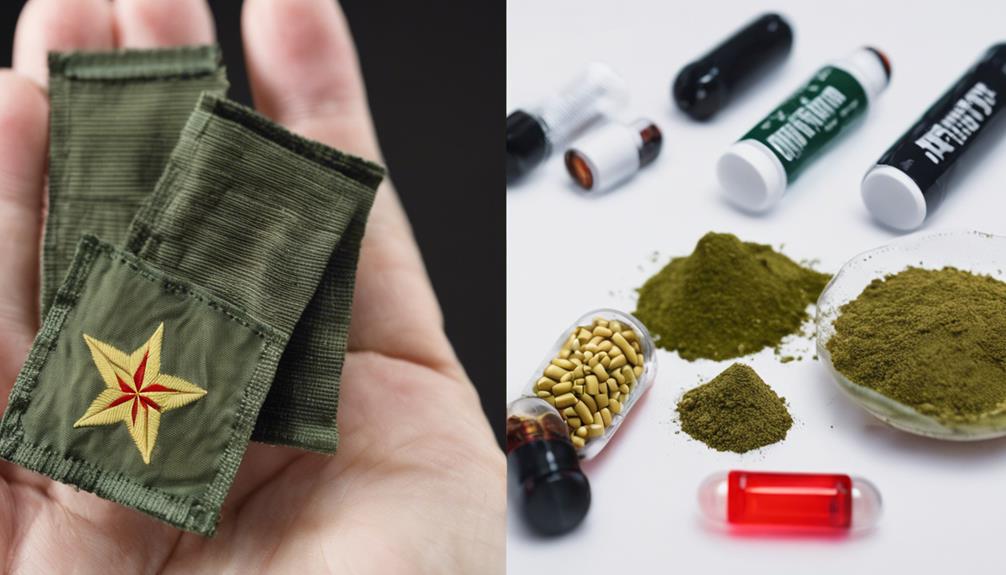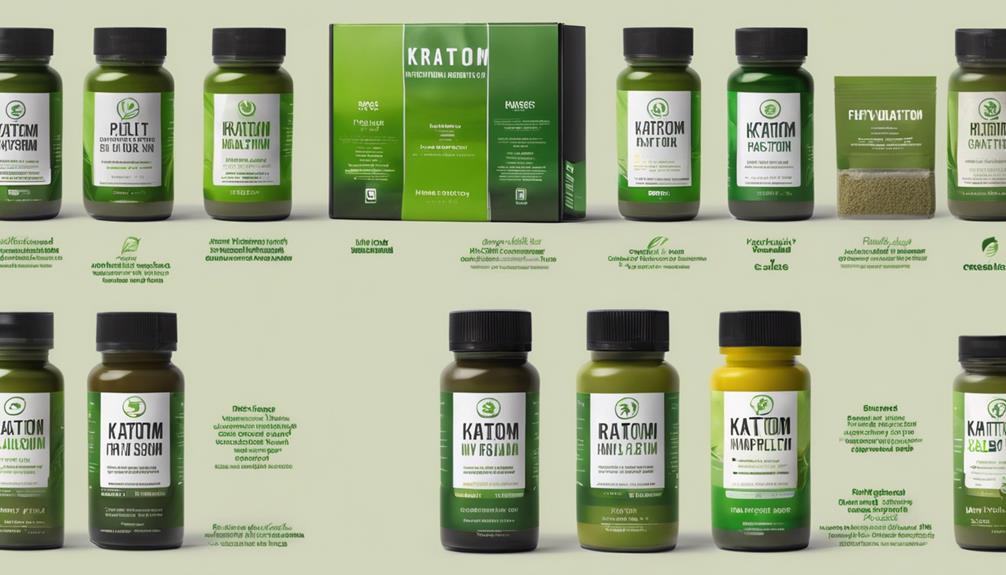You're likely to be tested for kratom in the military, as the Department of Defense strictly prohibits its use among service members due to its potential for drug dependency and lack of FDA approval. While standard drug tests won't detect kratom, specialized tests can detect its alkaloids. The military reserves the right to test for kratom if deemed necessary, although it's not currently included in routine drug testing. If you're a service member considering using kratom, be aware that detection can lead to disciplinary action and even compromise your military career – you'll want to know what's at stake.
Key Takeaways
- The military prohibits kratom use due to concerns over drug dependency and health risks, but it's not included in routine drug testing.
- Specialized tests can detect kratom alkaloids, such as mitragynine and 7-hydroxy mitragynine, but standard drug tests won't detect kratom.
- The military reserves the right to test for kratom if deemed necessary, although it's not a standard procedure.
- Detection time varies depending on the type of test, individual metabolism, and other factors, ranging from 6 hours to 90 days after consumption.
- Failure to comply with the prohibition on kratom use can result in disciplinary action, including legal implications and potentially even discharge from the military.
Kratom and Military Policy

As you consider taking kratom, you should understand the military's stance on this substance, which is strictly prohibited due to its potential for drug dependency and lack of FDA approval. The Department of Defense takes a firm stance against kratom, categorizing it as a dietary supplement that's not approved for consumption by military personnel. While kratom isn't currently included in routine drug testing, it's still considered a prohibited substance. If you're in the military, you must check with your commanding officer before taking kratom or any other supplement. Failure to comply with the military's policy may result in disciplinary action.
The prohibition on kratom is in place to protect service members from the potential risks associated with its use, including drug dependency. Opioid addiction is a significant concern, and the military aims to prevent its personnel from ingesting a product that could compromise their health and well-being. As a military personnel, prioritizing your health and adhering to the military's policy on kratom is vital.
Does Kratom Show Up on Drug Tests
As you consider kratom use, you're likely wondering if it'll show up on a drug test. The answer is, it depends on the type of test and how recently you've used kratom. You'll want to understand the different detection methods, including urine, blood, and hair tests, as well as the risk of false positive results.
Kratom Detection Methods
When you're facing a drug test, you must understand that kratom's detection is a complex issue, and the answer to whether it shows up on drug tests isn't a simple yes or no. Kratom, or Mitragyna speciosa, has unique properties that affect its detectability.
Here are some key points to consider:
- Standard drug tests won't detect kratom: Routine drug testing, like SAMHSA-5 or NIDA, won't detect kratom alkaloids.
- Specialized tests can detect kratom: However, specialized tests can detect mitragynine and 7-hydroxy mitragynine, two primary kratom alkaloids.
- Detection time varies: Urine tests can detect kratom up to 6 hours after heavy usage, while blood tests can detect it up to a few days after consumption. Hair tests can detect kratom use over a longer period.
- Honesty is the best policy: If you're taking kratom, it's best to inform the testing facility beforehand to ensure accurate detection methods are used and to avoid potential false-positive results.
False Positive Risks
You should be aware that kratom's unique chemical structure can lead to false positive results on drug tests, potentially causing confusion and misinterpretation of test outcomes. This is vital to keep in mind, especially if you're a military personnel undergoing a routine DoD drug test. Kratom may show up as a false positive for opioids due to cross-reactivity between kratom alkaloids and test antibodies. This highlights the importance of confirmatory testing to rule out any false positives. If you're taking kratom, notify the testing facility in advance to avoid any misunderstandings. Remember, kratom itself doesn't contain opioids, but its metabolites may resemble opiates in structure. Urine, blood, hair, and saliva tests can detect kratom metabolites, but specialized tests are required. Be cautious, as products containing kratom may lead to false positives on drug tests. It's vital to understand the risks of false positives and take necessary precautions to verify accurate test results.
Factors Affecting Kratom Detection

Several factors, including your body weight, hydration level, and individual metabolism, can substantially influence the detection of kratom in drug tests. These individual factors can affect how long kratom stays in your system and how easily it can be detected.
Key influences on kratom detection include:
- Body weight: Your body weight can impact how quickly kratom is processed and eliminated from your system.
- Hydration level: Staying hydrated can help flush out kratom from your system, making it harder to detect.
- Individual metabolism: Your metabolic rate can influence how quickly kratom is broken down and eliminated.
- Type of testing method: The type of drug test used can also impact kratom detection, with specialized tests being more likely to detect kratom use.
When it comes to passing a routine DoD drug test, using any product containing kratom, a substance derived from the Southeast Asian tree, can be risky. Kratom products can detect the presence of mitragynine and 7-hydroxy mitragynine, the primary psychoactive compounds in kratom, in drug tests. Understanding these factors can help you make informed decisions about kratom use and drug tests.
Types of Drug Tests for Kratom
When it comes to testing for kratom, you'll want to know about the different types of drug tests that can detect its presence. You might be interested to learn that urine drug screens, blood tests, and hair follicle tests are all used to detect kratom, each with its own window of detection. Understanding the strengths and limitations of each test type can help you navigate the complexities of kratom drug testing.
Urine Drug Screens
The military's standard drug testing protocol doesn't currently include kratom, but it's possible that a urine drug screen could detect its presence under certain circumstances. Since kratom alkaloids don't show up in standard five-panel drug tests, a specialized test would be needed to detect them.
Here are some key points to keep in mind when it comes to urine drug screens and kratom:
- Urine tests can detect mitragynine, a kratom alkaloid, up to 6 hours after heavy usage.
- Kratom isn't part of routine drug testing, but it could be tested for as part of a drug screening procedure.
- Specialized testing is required, such as LC-HRMS, which can detect kratom alkaloids in urine samples.
- Check with your commanding officer before taking any dietary supplements, including kratom, as they're subject to the same regulations as other supplements.
Blood Tests Used
You may be wondering how kratom is detected in the blood, especially since urine tests have limitations in detecting the substance. The military doesn't currently test for kratom as part of its routine drug testing, but that might change in the future. Blood tests can detect kratom in your system up to a few days after consumption, depending on the dosage and your individual metabolism. These tests involve advanced techniques like gas chromatography-mass spectrometry (GC-MS) or liquid chromatography-tandem mass spectrometry (LC-MS/MS) to detect mitragynine, a key kratom alkaloid. The detection window for kratom in blood tests varies depending on the test sensitivity, dosage, and individual factors, but it's generally shorter than for urine tests. Since kratom alkaloids don't show up in standard five-panel drug tests, special tests are required to detect kratom. If you're concerned about kratom use being detected, you should be aware that blood tests can be used to detect kratom, especially in specific circumstances.
Hair Follicle Tests
Hair follicle tests offer a unique window into your kratom use, as they can detect the substance up to 90 days after consumption, making them a valuable tool for determining long-term kratom use.
Here are some key facts about hair follicle tests for kratom:
- Detection window: Kratom can be detected in hair follicle tests for up to 90 days after consumption, making them ideal for determining long-term use.
- Accuracy: Hair follicle tests are considered more accurate and reliable than other drug testing methods, but their accuracy can be affected by hair dye, bleaching, or other chemical treatments.
- Testing process: Hair follicle tests involve collecting a hair sample, which is then sent to a laboratory for analysis, with results usually available within 3-5 business days.
- Factors affecting results: The detection window for kratom in hair follicle tests varies depending on the individual's hair growth rate, with an average detection window of 30-60 days.
Kratom Detection in Biological Samples

When you're screened for drugs, kratom detection in biological samples becomes essential, as it can reveal evidence of recent or past use. Biological samples, including urine, blood, and hair, can be tested for kratom. Urine tests can detect mitragynine, a kratom alkaloid, up to 6 hours after heavy usage. Blood tests, on the other hand, can detect kratom in your system up to a few days after consumption. Hair tests are also useful, as they can detect kratom use over a longer period, making them valuable for determining dosage recommendations. Bear in mind that kratom may show up as a false positive for other drugs, such as opiates, due to cross-reactivity between kratom alkaloids and test antibodies. While the military doesn't have a standardized kratom drug test, employers or entities may choose to test for it using standard drug screens. Understanding how kratom detection works in biological samples can help you prepare for potential drug tests.
Legal Implications of Kratom Use
As a member of the military, you must recognize that the use of kratom is strictly prohibited, and its detection can have serious legal implications for your military career. The United States Department of Defense has a strict stance against kratom due to its lack of FDA approval, and its use is prohibited for military personnel.
Here are the key legal implications of kratom use:
- Disciplinary action: Failure to comply with the prohibition on kratom use may result in disciplinary action against military personnel.
- Prohibited substance: Kratom is considered a prohibited substance, and its detection can have severe consequences for your military career.
- Drug testing: Although kratom is not currently included in routine drug testing, it could be tested for as part of a drug screening procedure.
- Career implications: A positive test for kratom can lead to serious legal implications, including disciplinary action, and potentially even discharge from the military.
It's essential to understand the legal implications of kratom use and to avoid using this drug to protect your military career.
Are Military and Army Kratom Testing Policies the Same?
Yes, the military and army’s kratom testing policies are generally the same. Both branches prohibit the use of kratom due to its potential for abuse and negative effects on cognitive and physical performance. Random drug tests are conducted to ensure compliance with the policies.
Kratom Use and Military Regulations

You should be aware that the military has strict regulations governing kratom use, and understanding these regulations is essential to avoiding disciplinary action and protecting your military career. As a service member, it's vital to know that kratom is prohibited in the military due to concerns over its potential to lead to drug dependency and pose a risk to your health and well-being. Although kratom isn't currently included in routine drug testing, the military reserves the right to test for it if deemed necessary. The United States Department of Defense takes a strict stance against kratom due to its lack of FDA approval and potential for adverse effects. Before taking any dietary supplements, including kratom, you should always check with your commanding officer. Remember, the military's prohibition on kratom use aims to prevent service members from ingesting a product that could compromise military readiness. By understanding these regulations, you can avoid putting your military career at risk.
Frequently Asked Questions
Is Kratom Illegal in the Usmc?
You're wondering if kratom is illegal in the USMC? Well, let's break it down. The Marine Corps follows the Military Ban on kratom use, which is part of the Department of Defense's strict Drug Policy. As a service member, you're expected to adhere to Military Law, and kratom use is considered a prohibited activity. While it's not detected in routine Drug Testing, using kratom can lead to disciplinary action under Military Justice. So, to answer your question, kratom use is in effect illegal in the USMC.
Is Kratom Legal in Florida?
You're wondering if kratom is legal in Florida. The good news is that it is! Florida laws currently allow Kratom usage, and it's often used as a herbal remedy to combat the opioid crisis and substance abuse. As public opinion shifts towards alternative solutions, kratom remains a popular choice. However, you should stay informed about state regulations, as they can change. For now, you can breathe easy knowing kratom is legal in Florida.










